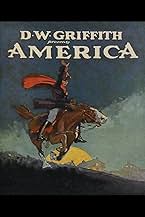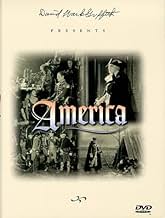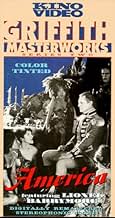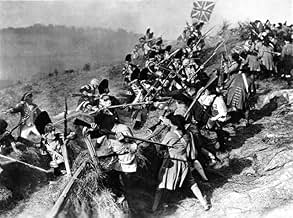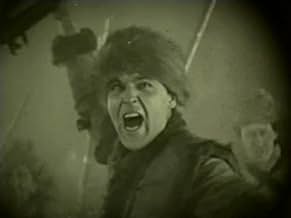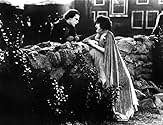अपनी भाषा में प्लॉट जोड़ेंThe story of a family caught up in the American Revolutionary War.The story of a family caught up in the American Revolutionary War.The story of a family caught up in the American Revolutionary War.
- पुरस्कार
- कुल 1 जीत
Lucille La Verne
- A Refugee Mother
- (as Lucile La Verne)
Paul Doucet
- Marquis de Lafayette
- (as H. Paul Doucet)
फ़ीचर्ड समीक्षाएं
America (1924) tells the story of the American Revolutionary War through the perspectives of Nathan Holden (Neil Hamilton), a commoner who fights for the American cause, and the aristocratic Montague family, with whose daughter Nancy (Carol Dempster) Nathan has fallen in love. Their love is complicated not only by the class divide, but by conflicting political loyalties. Things are further complicated when Captain Butler (Lionel Barrymore) declares his love for Nancy as well. Supposedly, he is fighting for the British, but he has ambitions of his own that force the two sides to unite against a common enemy. Directed by DW Griffith.
SCRIPT: It seems obvious that Griffith is aiming to recapture the epic scale of BIRTH OF A NATION, and thankfully this film doesn't have as much racism as BOAN. The movie shows tightness in the battle scenes, and the reasons for the conflict are deftly sketched out. However, the movie takes a while to get going. The script has several issues: the clichéd story of "love at first sight" between Nathan and Nancy, told in groan-inducing purple prose; very shallow characterizations (especially Griffith's patronizing attitude toward daddy's girl Nancy, calling her a "little Tory" with "slight knowledge of politics"), and an overemphasis on Butler's villainy at the expense of the main conflict. I find Griffith's repeated tendency to place his heroine in the lustful hands of a brute annoying and distasteful, as well as his use of the word "savages" to describe Native Americans. The story told here just isn't very interesting, and some of the love scene title cards are really awful. SCORE: 4/10
ACTING: Hamilton and Dempster don't show much spark as a couple overall. Dempster in particular doesn't engage with her role as an aristocrat in the beginning; she just doesn't have the hauteur that you would expect and her character shows very little personality or depth. She does improve somewhat later on, providing some touching moments, but her performance suffers from Griffith's insistence on fashioning her after Lillian Gish. Neil Hamilton is too understated in the beginning but shows some feeling later, particularly in one scene where he has to make a very difficult choice. The romance between the two is never really convincing. Lionel Barrymore, though, steals the show in his scenes, playing the evil Captain Butler with sadistic glee and gusto. The other players are OK but not outstanding. SCORE: 5.5/10
CINEMATOGRAPHY/PRODUCTION: Many scenes in the first hour or so are presented in a stagy, tableaux-like fashion that may have been acceptable in 1914 but definitely not in 1924. The camera-work becomes more interesting once we get to Paul Revere's ride, but then goes rather static again. There were some overlong close-ups on Carol Dempster at times that appear to have been done after the main filming was complete, and she is directed to emote in a way that doesn't match the title cards or the context of the scene. SCORE: 5.5/10
SUMMARY: America stands as DW Griffith's last attempt at an epic-scale production. Although he tries to replicate the scale of BIRTH OF A NATION, the movie overall feels dull and uninspired. The script suffers from a corny, unconvincing central romance and shallow characterizations. The acting also suffers from a lack of charisma and inspiration, and the cinematography is unusually reserved and stiff, with just a few moments of visual interest. PLEASE NOTE: Griffith's antiquated insistence on using white actors for the black and Native American parts will not set well with many viewers, myself included, but thankfully this was the last time he would do so. SCORE: 5/10
SCRIPT: It seems obvious that Griffith is aiming to recapture the epic scale of BIRTH OF A NATION, and thankfully this film doesn't have as much racism as BOAN. The movie shows tightness in the battle scenes, and the reasons for the conflict are deftly sketched out. However, the movie takes a while to get going. The script has several issues: the clichéd story of "love at first sight" between Nathan and Nancy, told in groan-inducing purple prose; very shallow characterizations (especially Griffith's patronizing attitude toward daddy's girl Nancy, calling her a "little Tory" with "slight knowledge of politics"), and an overemphasis on Butler's villainy at the expense of the main conflict. I find Griffith's repeated tendency to place his heroine in the lustful hands of a brute annoying and distasteful, as well as his use of the word "savages" to describe Native Americans. The story told here just isn't very interesting, and some of the love scene title cards are really awful. SCORE: 4/10
ACTING: Hamilton and Dempster don't show much spark as a couple overall. Dempster in particular doesn't engage with her role as an aristocrat in the beginning; she just doesn't have the hauteur that you would expect and her character shows very little personality or depth. She does improve somewhat later on, providing some touching moments, but her performance suffers from Griffith's insistence on fashioning her after Lillian Gish. Neil Hamilton is too understated in the beginning but shows some feeling later, particularly in one scene where he has to make a very difficult choice. The romance between the two is never really convincing. Lionel Barrymore, though, steals the show in his scenes, playing the evil Captain Butler with sadistic glee and gusto. The other players are OK but not outstanding. SCORE: 5.5/10
CINEMATOGRAPHY/PRODUCTION: Many scenes in the first hour or so are presented in a stagy, tableaux-like fashion that may have been acceptable in 1914 but definitely not in 1924. The camera-work becomes more interesting once we get to Paul Revere's ride, but then goes rather static again. There were some overlong close-ups on Carol Dempster at times that appear to have been done after the main filming was complete, and she is directed to emote in a way that doesn't match the title cards or the context of the scene. SCORE: 5.5/10
SUMMARY: America stands as DW Griffith's last attempt at an epic-scale production. Although he tries to replicate the scale of BIRTH OF A NATION, the movie overall feels dull and uninspired. The script suffers from a corny, unconvincing central romance and shallow characterizations. The acting also suffers from a lack of charisma and inspiration, and the cinematography is unusually reserved and stiff, with just a few moments of visual interest. PLEASE NOTE: Griffith's antiquated insistence on using white actors for the black and Native American parts will not set well with many viewers, myself included, but thankfully this was the last time he would do so. SCORE: 5/10
Slow but beautifully-mounted story of the American revolution. Griffith's story-telling seems a lot less heavy-handed than in his earlier historical epics and his tableaux work is fully integrated into the action. Lionel Barrymore is an utter swine, Neil Hamilton is poor but dashing and Carol Dempster is.... well, Carol Dempster is most of what is wrong with Griffith in this period, but she doesn't show up often enough to slow the pace and drama.
Note that the trivia for this movie says it came in originally at slightly more than 2 hours when first released, but that no cut exists that runs longer than 90 minutes. However, the dvd release has been presented at a slower fps rate that increases the tension and brings it back to a bit over two hours.
Far better in terms of story-telling than sound versions, such as THE PATRIOT. While not quite in the league of Griffith's best, such as WAY DOWN EAST and BROKEN BLOSSOMS, an excellent way to spend a couple of hours.
Note that the trivia for this movie says it came in originally at slightly more than 2 hours when first released, but that no cut exists that runs longer than 90 minutes. However, the dvd release has been presented at a slower fps rate that increases the tension and brings it back to a bit over two hours.
Far better in terms of story-telling than sound versions, such as THE PATRIOT. While not quite in the league of Griffith's best, such as WAY DOWN EAST and BROKEN BLOSSOMS, an excellent way to spend a couple of hours.
Neil Hamilton played the lead in Griffith's big-budgeted and sprawling February 1924 "America." In a rare Hollywood film about the Revolutionary War, "America," marking the near 150th anniversary of the conflict's beginning, offers a love story in the middle of the pivotal moment in the United States' founding. Nathan (Hamilton), who sympathizes with the rebels and is a minuteman, is in love with Nancy (Dempster), whose father is a Tory. The Romeo and Juliet romance bounces around as Griffith captures the opening rounds of the Revolutionary War with the battles of Lexington and Concord, Massachusetts, followed by scenes of Valley Forge. The director's trademark heart-pounding conclusion that he perfected in his 1915 'The Birth of a Nation,' is found in "America." Cross-cutting between a fort filled with settlers under siege from the British and its allied Indians with the horse-bound Morgan raider colonists rescuers normally would assure this Griffith movie was going to be a box office smash.
The director, after spending a considerable amount of his personal money into the project, saw just the opposite in the amount of empty seats in the theaters. The critics were split down the middle on its praise, but even Griffith loyalist Lillian Gish, in her autobiography, wrote, "Apart from a few scenes, the film was a heartbreaking disappointment." The receipts were so thin that Griffith, following the dismal reception in "Life Is Wonderful," was forced to sell his Mamaroneck, New York, movie studio as well leave United Artists. He found himself now as an independent director for hire, something that never crossed his mind before 1924.
The director, after spending a considerable amount of his personal money into the project, saw just the opposite in the amount of empty seats in the theaters. The critics were split down the middle on its praise, but even Griffith loyalist Lillian Gish, in her autobiography, wrote, "Apart from a few scenes, the film was a heartbreaking disappointment." The receipts were so thin that Griffith, following the dismal reception in "Life Is Wonderful," was forced to sell his Mamaroneck, New York, movie studio as well leave United Artists. He found himself now as an independent director for hire, something that never crossed his mind before 1924.
I really wanted to like this film and I don't think I was terribly disappointed. Being an American History teacher, I felt an obligation, almost, to see this film and as far as the history went, it wasn't bad. Sure there were a few mistakes here and there (especially with the timeline--the movie only appeared to last a few months or perhaps a year--not over six years of actual fighting), but the overall spirit of the film and the battle sequences were excellent. Unfortunately, the movie ALSO included a pretty meaningless subplot involving a difficult to believe romance between a poor patriot and a rich Loyalist. For the most part, it really served to distract from the overall plot and just seemed "tacked on"--like a plot device instead of a real honest-to-goodness romance. In fact, as much of the romance boiled down to the dumb cliché of "love at fist sight", it was kind of annoying the more I think about it.
However, in spite of this romance, the film is truly interesting and inspiring---plus, in so many ways it seems as if the much later film, THE PATRIOT, was copied from this Griffith film!!! Both films followed the exploits of an evil leader fighting for the British and using horrible and evil tactics against the civilians--and both having the secret intention of using this as a "springboard" to starting their OWN nation in the America!!! The only major difference is that this film is set in the North and THE PATRIOT was in the Carolinas. It sure would have been nice if Mel Gibson and the rest had acknowledged their debt to D. W. Griffith for the story ideas. It just doesn't seem all that likely that the two stories were created independently of each other.
PS--Despite me liking this film and some other of Griffith's films, he DOES deserve to once again "burn in hell" for his having White actors portray all the Black servants in the film! This is a sick and bigoted thing that Griffith did in so many of his films--especially in BIRTH OF A NATION. I gotta assume based on this and the way he portrays Blacks that he was A-OK with slavery and was quite the apologist for this "quaint institution" (don't get mad at me--this IS meant as sarcasm).
However, in spite of this romance, the film is truly interesting and inspiring---plus, in so many ways it seems as if the much later film, THE PATRIOT, was copied from this Griffith film!!! Both films followed the exploits of an evil leader fighting for the British and using horrible and evil tactics against the civilians--and both having the secret intention of using this as a "springboard" to starting their OWN nation in the America!!! The only major difference is that this film is set in the North and THE PATRIOT was in the Carolinas. It sure would have been nice if Mel Gibson and the rest had acknowledged their debt to D. W. Griffith for the story ideas. It just doesn't seem all that likely that the two stories were created independently of each other.
PS--Despite me liking this film and some other of Griffith's films, he DOES deserve to once again "burn in hell" for his having White actors portray all the Black servants in the film! This is a sick and bigoted thing that Griffith did in so many of his films--especially in BIRTH OF A NATION. I gotta assume based on this and the way he portrays Blacks that he was A-OK with slavery and was quite the apologist for this "quaint institution" (don't get mad at me--this IS meant as sarcasm).
America (1924)
*** (out of 4)
This film is basically a remake of The Birth of a Nation but this time the story is set during the American Revolutionary War. We have George Washington (Arthur Dewey) trying to make our country free while Capt. Walter Butler (Lionel Barrymore) tries to get the Indians on his side to attack what one hopes to become the new America. In the mean time, two young lovers (Neil Hamilton, Carol Dempster) are split apart due to them fighting on opposite sides of the war. This film was a notorious flop when originally released and everything Griffith made after this was basically done so that he could clean up debts gathered by this film. Time has certainly been kinder to the film than movie crowds in 1924 because this is a pretty strong take on the war that features a nice story, great battle scenes and some fine performances. Barrymore steals the show with his crazed performance but he never goes over the top but even without words you can see the passion on his face as he fights for what he believes is right. Hamilton and Dempster are both fine in their roles, although I'm sure stronger actors would have been better. The majority of the film deals with the actual story of the war and not the battle scenes. Griffith handles all the quiet moments very well but there's no question that the battle scenes are where the energy is at. Hundreds of extras were used and again, like previous Griffith epics, the battle scenes look incredibly realistic as if Griffith were there filming while the real battles were taking place. The story of the families being split apart probably would have worked better had it not been so familiar as to the story in The Birth of a Nation but either way this was Griffith's last epic and while it's not the masterpiece of The Birth of a Nation or Intolerance, it's still impressive film-making.
*** (out of 4)
This film is basically a remake of The Birth of a Nation but this time the story is set during the American Revolutionary War. We have George Washington (Arthur Dewey) trying to make our country free while Capt. Walter Butler (Lionel Barrymore) tries to get the Indians on his side to attack what one hopes to become the new America. In the mean time, two young lovers (Neil Hamilton, Carol Dempster) are split apart due to them fighting on opposite sides of the war. This film was a notorious flop when originally released and everything Griffith made after this was basically done so that he could clean up debts gathered by this film. Time has certainly been kinder to the film than movie crowds in 1924 because this is a pretty strong take on the war that features a nice story, great battle scenes and some fine performances. Barrymore steals the show with his crazed performance but he never goes over the top but even without words you can see the passion on his face as he fights for what he believes is right. Hamilton and Dempster are both fine in their roles, although I'm sure stronger actors would have been better. The majority of the film deals with the actual story of the war and not the battle scenes. Griffith handles all the quiet moments very well but there's no question that the battle scenes are where the energy is at. Hundreds of extras were used and again, like previous Griffith epics, the battle scenes look incredibly realistic as if Griffith were there filming while the real battles were taking place. The story of the families being split apart probably would have worked better had it not been so familiar as to the story in The Birth of a Nation but either way this was Griffith's last epic and while it's not the masterpiece of The Birth of a Nation or Intolerance, it's still impressive film-making.
क्या आपको पता है
- ट्रिवियाThis film is regarded as a major turning point in the career of D.W. Griffith. Its critical and public failure ended Griffith's tenure as the industry's preeminent director.
- गूफ़Paul Revere falls off his horse. For some reason, Griffith has Revere ride up the steps of people's homes to announce "The British are coming!" as if he has to shout this at their doors. Backing down one set of stairs, Revere's horse falls, tossing the actor, who quickly recovers and shows considerable concern for the horse's welfare. Griffith left in the spill.
- भाव
Nathan Holden: Love may come and love may go, and sigh like the wind from tree to tree. But I shall love no more, no more, till this fair maid come back to me.
- कनेक्शनEdited into The Negro Soldier (1944)
टॉप पसंद
रेटिंग देने के लिए साइन-इन करें और वैयक्तिकृत सुझावों के लिए वॉचलिस्ट करें
विवरण
- चलने की अवधि2 घंटे 21 मिनट
- ध्वनि मिश्रण
- पक्ष अनुपात
- 1.33 : 1
इस पेज में योगदान दें
किसी बदलाव का सुझाव दें या अनुपलब्ध कॉन्टेंट जोड़ें


